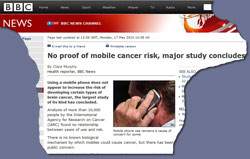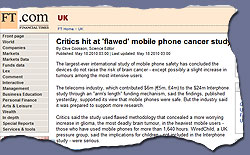 |
 |
|
Mobile Phone Controversy Rages On - Interphone Study Released With the UK media both in the TV and print claiming that the latest mobile phone study into the health effects upon long term users showing no link with cancer, one would be forgiven for believing that the controversy is now over. The Interphone study was one of the most wide spread studies involving Scientists in 13 countries under the auspices of the International Agency for Research on Cancer, part of the World Health Organisation; involving interviews with 5,100 brain cancer patients and a similar number of matched "controls", who did not have cancer, about their mobile phone use. But there has been major argument amongst scientists and governments of those 13 countries as to how to interpret the results. Furthermore, as this website has reported many times since 2004, the delay to the publication of the study results has caused major concern, not least amongst the scientific community and it's respected journals. The Interphone Study report results are available to download from the E-Library Database
The news item goes on: Analysis of more than 10,000 people by the International Agency for Research on Cancer (IARC) found no relationship between years of use and risk. There is no known biological mechanism by which mobiles could cause cancer, but there has been public concern. It is hoped this study will allay some anxieties, as research continues. The overall rate of brain cancer has not risen in countries where use has long been prevalent - like Sweden, and studies have mostly found no evidence of an increased risk. This latest research is consistent with this. The 20m euro (£17m) Interphone study, which received some funding from the mobile industry, involved more than 5,000 men and women from 13 countries who had been diagnosed with one of two types of brain cancer - glioma and meningioma - between 2000 and 2004. These cancers, both rare, were judged to be among the most likely to be influenced by phone use." The remainder of the article goes into little detail of the study itself, and quotes Professor Anthony Swerdlow of the Institute of Cancer Research, which carried out one of the two UK arms of the study: As reported by Unionsafety last week, a study called Cosmos was launched last month to examine the long term effects of mobile phone use. This cohort study on mobile communications, will recruit 250,000 and follow them for as long as 30 years. It is being funded in the UK by the Mobile Telecommunications and Health Research programme, an independent body, for an initial five year period.
"Critics said the study used flawed methodology that concealed a more worrying increase in glioma, the most deadly brain tumour, in the heaviest mobile users - those who have used mobile phones for more than 1,640 hours. WiredChild, a UK pressure group, said the implications for children - not included in the Interphone study - were serious." The article continues: "Although data collection ended in 2004, publication of the study was delayed while the researchers argued about how best to present their results. It eventually appeared yesterday in the International Journal of Epidemiology . A particular issue was the finding that regular mobile users had less brain cancer than non-users matched for sex, age and social background - though there is no biologically plausible way phones could actually protect against tumours. When the results are adjusted to correct for this apparent flaw in the study method, there is a larger increase in cancer risk among the most intense mobile users." Not surprisingly it also reported that " The leaders of the study in the UK, Professors Anthony Swerdlow of the Institute of Cancer Research and Patricia McKinney of Leeds University, were more dismissive of any apparent causal link between mobile phone use and brain cancer."
"Everyone anticipated that Interphone wouldn't offer any definitive findings, and they were right. "An increased risk of brain cancer [has not been] established," said Christopher Wild, the director of the International Agency for Research on Cancer (IARC) in Lyon, which coordinated the study. Jack Siemiatycki of the University of Montreal, a member of the Canadian Interphone group, called the Interphone "genuinely perplexing, enigmatic and paradoxical" because, as he put it, "the data were dirty." (Siemiatycki said his perception of the risk has gone "from implausible to something higher.")
Chris said, "The problem here is that up to now too many with vested interests have been involved in the funding of many of these international studies. That plus the delay to the publication and controversy over the results of this latest study, does nothing to assure me that the interpreted results of the research is not tainted. Furthermore, just because we do not yet understand the mechanics of how non-ionizing radiation from mobile phones can be linked with cancer, does not mean there is no link." On the wider issues around mobile phone use, he added: "Whilst everyone is rightly concerned over brain cancers, we should be looking at all of the negative health effects of continuous mobile phone use from brain cancer to cancers of the mouth, effects on memory, mental status, concentration and on the social impact of mobile phone use upon the individual and our society." He cited the problems with concentration and the negative effects upon social skills found in children using texting every day, and the number of accidents caused by people driving whilst using their mobile phones and crossing roads in front of traffic whilst texting etc. "We need to address these issues thoroughly but until people take seriously the various health risks and social impact around mobile phone use and control its use, nothing will change." he concluded. Derek Maylor, Chair of the NW BTU H&S Co-ord said that more needs to be done in terms of research: "Until such time as conclusive proof is available, if there ever will be, we must take a precautionary view and keep our eyes open to any future research. We cannot simply reject reports of health problems as a result of mobile phone use as being irrelevant and coincidental, but need to follow sensible guidelines when it comes to our use of mobile phones." He added, " Mobile phone use can present a risk to the health and safety of those using them to a lesser or greater degree, depending upon the situation in which they are used. GPS and Sat Nav have their own specific health concerns. We should all bare this in mind and use risk assessment techniques in order to minimise the risk." Source: BBC news / Financial Times Full Interphone Study Report available from the E-Library Database Related news items: Mobile Phones May Pose Cancer Risk Afterall Interphone Mobile Phone Study Results Due Out Mobile Phone Radiation Review Of Scientific Research Published New Analysis Reaffirms Long-Term Tumour Risk Full article from Microwave News on the Interphone Study here Various documents on mobile phone safety can be found in the E-Library Database under the category of Electro-Magnetic Radiation, including a special report from Microwave News entitled Children and Cellphones.
|



 Unionsafety website editor, Chris Ingram, who has been watching keenly the developements in research over the years, raised as long ago as 1999 concerns over the continuous use of mobile phones and the effects on the health of those using them consistently every day based on anecdotal evidence available then. His view is that the mobile phone industry will end up being seen as behaving in a very similar way to that of the tobacco industry, having been forced recently into publishing the truth about the levels of radiation emitted by the various manufacturers handsets.
Unionsafety website editor, Chris Ingram, who has been watching keenly the developements in research over the years, raised as long ago as 1999 concerns over the continuous use of mobile phones and the effects on the health of those using them consistently every day based on anecdotal evidence available then. His view is that the mobile phone industry will end up being seen as behaving in a very similar way to that of the tobacco industry, having been forced recently into publishing the truth about the levels of radiation emitted by the various manufacturers handsets.